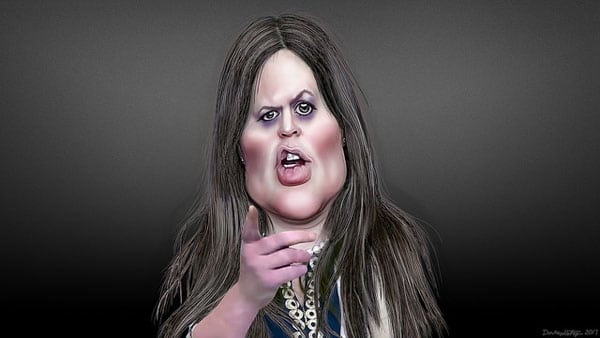
One of the best pieces I read recently is a Splinter article by Hamilton Nolan titled “This Is Just the Beginning,” about the growing backlash against “people who wield great power.” While he rails against Trump and what he calls his “fascism-enabling friends,” the same can easily be said about leaders in the nonprofit sector facing their own backlash as the racial equity movement spreads across the sector.
But let’s start at the beginning, or at least a beginning. The anchoring event of Nolan’s piece is Red Hen co-owner Stephanie Wilkinson asking Sarah Huckabee Sanders to leave her restaurant last week after her staff called on her to because she didn’t meet its standards of “honesty and compassion, and cooperation” and the “fury and fawning” of thousands of responses that followed on social media.
As usual, Trump weighed in with a fact-averse Tweet we won’t recall here, because why?
Recounting the development of the story this week, the Washington Post’s Avi Seik and Sarah Murray write, “Over the next two days, a backlash against the Red Hen grew in intensity, eventually reaching the White House.” Sanders’ response? “We are allowed to disagree, but we should be able to do so freely and without fear of harm.”
Also last week, Kirstjen Nielsen, the Secretary of Homeland Security, was heckled by protestors chanting “Shame!” and “End family separation!” while attempting to eat at a Mexican restaurant. Stephen Miller, Trump advisor on immigration policy, was called a “fascist” at a restaurant. Pam Bondi, the Florida attorney general closely aligned with Trump, was escorted out of a movie theater after a protester screamed, “You are a horrible person.”
The Chicago Tribune’s Mary Jordan writes, “Anger and division in American politics are creating a rising phenomenon: the public shaming and shunning of political figures while they are going about their private lives.” She frames the shunning of people because of political ideology as new, unlike the more established reasons for shunning: being black, a woman, or LGBTQ.
While some, like Rep. Maxine Waters, say these people know what they are doing is wrong and they will—should—be protested, others, like David Axelrod, former Chief Strategist for Obama’s campaigns, expressed disapproval that “the Left” would behave this way, further dividing the country. David Cole, national legal director of the ACLU, also thought it was wrong, but was clear that refusing service based on political ideology is only illegal in DC, Seattle, and the Virgin Islands.
As the saga unfolded, House Minority Leader Nancy Pelosi came out against Rep. Waters, Sen. Cory Booker distanced himself from her in comments to MSNBC, and The View co-host Meghan McCain called her “extremely dangerous.” That’s right. She is dangerous to the status quo, and that’s a good thing.
This is where Nolan steps in. “One thing that people who wield great power often fail to viscerally understand is what it feels like to have power wielded against you…This sort of insulation from the real-world consequences of political and economic decisions makes it very easy for powerful people to approve of things happening to the rest of us that they would never, ever tolerate themselves.”
There are a few notable aspects of Nolan’s piece. The first is Nolan’s identity as powerful. Rather than be overwhelmed, cowed, by the onslaught of inhumane actions by Trump et al., he issues a warning:
Sign up for our free newsletters
Subscribe to NPQ's newsletters to have our top stories delivered directly to your inbox.
By signing up, you agree to our privacy policy and terms of use, and to receive messages from NPQ and our partners.
Do you think that being asked to leave a restaurant, or having your meal interrupted, or being called by the public is bad? My fascism-enabling friends, this is only the beginning.
[…]
This is all going to get more extreme. And it should. We are living in extreme times.
Second, Nolan contextualizes the event—and this is important. One of the tactics of domination is to remove events from history, to create a “level playing field” without context. But this is a ruse that hides the impact of unchecked power—in this case, the taking away of children from their families, which results in irrevocable harm, which is violence. How can we talk about civility in the face of people taking other people’s children?
When placed in context, the relationship of shunning to this incredible violence is asymmetrical. In fact, shunning is one of the few weapons of the subordinated, who don’t have to approve of the violence against them, much less collude in it. To define civility as the absence of shunning, while ignoring the violence of the rupture of one’s source of sustenance must be called out as a false equivalency.
Finally, Nolan highlights the fact that being insulated from the consequences of one’s actions disconnects the powerful from those over whom they wield power and erodes civility. Alexandria Ocasio-Cortez, the young Puerto Rican woman who just beat New York Representative Joe Crowley in the Democratic primary, reminds us that insulation from accountability harms civil society: “One of the biggest dangers of this administration is the erosion of norms, which is pretty typical for authoritarian regimes.”
This is true everywhere, including our organizations. As the concept and practices of racial equity begin to take hold and white leaders have to step up, often to keep getting philanthropic dollars, the terrain starts to shift uncomfortably as they begin to understand what it means to share power with people of color. It means they (or you) don’t get to determine reality anymore. In fact, your dominant power may be exactly why you probably won’t be leading the change. It means people of color will refuse to live the double consciousness of signifying that change for your organization and quietly dealing with the very present power dynamics that don’t shift overnight, the speaking of which is often the white leader’s greatest fear. Unchecked privilege—defined as not being subject to the demands of others, or the lack of engagement and mutuality—disconnects the powerful from shared realities, mocks any claims to fairness, and undermines civility. It often leads to authoritarian regimes in our own organizations too.
If you are one of these white leaders, don’t be like Sarah Huckabee Sanders—don’t hide your power behind the pain of being held accountable. Time is short. The work is real. We need you to be bolder. The pain of giving up power is not the top priority right now. Others are suffering more. Be honest about the power you wield. Negotiate openly. We must remember that what is at stake is the right to life, to care, to opportunity.
The development of powerful identities is key to resisting dominant power, power that refuses engagement and mutuality, the ingredients for civility. People of color will challenge at times as we work to shift power dynamics in our organizations and the country. It’s not disrespectful. These are not abstract discussions removed from context or history. Our actions are not inherently right or wrong, but moves in the struggle against domination. The everyday, systemic, unspectacular forms of violence—“perpetrator-less crimes”—that play out in our organizations are part and parcel of these more exceptional national events. It is time to wield power against dominant practices everywhere and for that to be recognized as visionary leadership.












